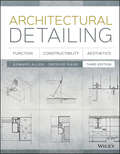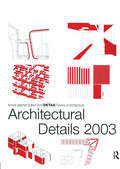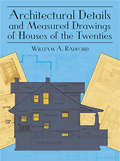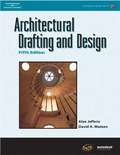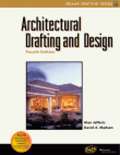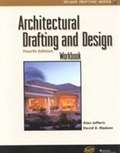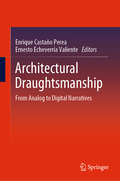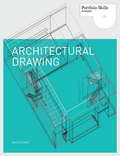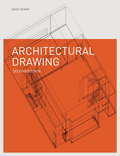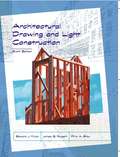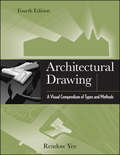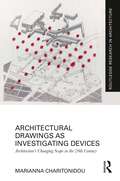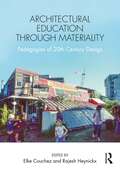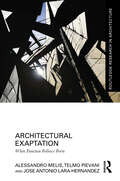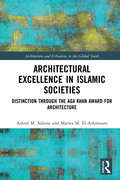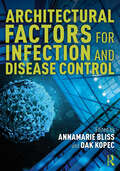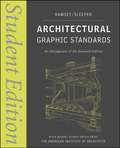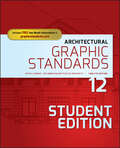- Table View
- List View
Architectural Detailing
by Edward Allen Patrick RandThis edition of the industry standard on architectural detailing includes new sections covering analysis and modification of existing details and design of new details, both basic and advanced. Revised to address sustainability and to reflect the International Building Code®, Architectural Detailing continues to deliver reliable, insightful information on how to design details that will be water- and airtight, control the flows of heat and water vapor, adjust to all kinds of movement, age gracefully, be easy to construct, and still look good.Conveniently organized by the three major concerns of the detailer--function, constructibility, and aesthetics--this edition features:Richly illustrated examples of detail design, case studies, and practical exercises.New and revised patterns showing form, constructibility, and aesthetics.Everything you need, whether a student or professional, to design details that work.Order your copy today.Content from this book is available as an online continuing professional education course at http://www.wiley.com/WileyCDA/Section/id-320255.html#leakproof_details. WileyCPE courses are available on demand, 24 hours a day, and are approved by the American Institute of Architects.
Architectural Detailing: Function Constructability Aesthetics
by Jason Miller Edward Allen Patrick RandThe industry-standard guide to designing well-performing buildings Aesthetics are a vital part of good design. Great design emerges from a deep understanding of the functionality and constructability of details. Good details provide clear, complete, and correct information to the wide variety of users that need them. Architects guide a project from design idea to buildable reality by working with other building industry professionals and creating a set of details that show how things are put together. Architectural Detailing systematically describes the principles for designing good architectural details. Using patterns that demonstrate best practices and consistent approaches to design detailing, this book teaches why detailing is important, what factors shape detailing issues, and how to detail a building that meets or exceeds performance requirements. Extensive illustrations demonstrate how to design building details that will not leak water or air, will control the flow of heat and water vapor, will adjust to all kinds of movement, and will be easy to construct. This fourth edition has been updated to conform to the latest International Building Codes and International Energy Conservation Code requirements and incorporates current knowledge about new material and construction technology, including: Expanded patterns for sustainability, high performance architecture, and resilience Examples using panelized or modularized prefabricated building assemblies Complex case studies demonstrating the detailing design process for energy efficient structures Design detailing for maintenance and management of sensitive or weak spots in a building assembly Architectural Detailing helps you bring a building together with a well detailed design that communicates effectively at all levels of the construction process.
Architectural Details 2003
by Detail MagazineThis is a compilation of the full year's information, including: the "Discussion" section, where well-known architects and critics as well as specialist authors and architectural historians articulate their views; the "Documentation" section containing an analysis of selected projects, in which buildings from around the world are covered in depth; and the "Technology" section where the specific theme of each issue of the magazine is treated in greater depth. Along with these are illustrations of the high standards that Detail is known for, where all plan drawings are true to scale and have been approved by the architects, planners and engineers responsible for the original design.This annual sourcebook is a beautiful record, not only of the year's Detail publication, but of some of the best, and most innovative contemporary architecture
Architectural Details and Measured Drawings of Houses of the Twenties
by William A. RadfordProvides details for frame houses, houses of brick, brick veneer, stucco, etc., as well as plans for barns, silos, ice houses, and other farm structures. Also includes plans for such interior features as built-in buffets and sideboards, kitchen cabinets, wardrobes, window seats, breakfast nooks, fireplaces, and more. 154 black-and-white illustrations.
Architectural Drafting For Interior Designers
by Lydia ClineBeginning interior designers can learn how to graphically communicate their ideas with a resource that is designed specifically for them. While traditional drafting books focus on architectural and engineering readers, Architectural Drafting for Interior Designers, Second Edition, eliminates irrelevant coverage and incorporates material and examples that are meaningful to today's interior designers. This book also addresses the specific needs of beginning interior designers by focusing on topics needed before AutoCAD is even introduced, such as how to draw a floor plan, how to use it to create an interior elevation, and how to understand the relationship between 2D and 3D drawings. Updated to include a new chapter on integrating software with hand drawings, and with content thematically reorganized, this edition is more comprehensive and intuitive than ever. The only book that is written to the standards of the National Council for Interior Design Qualifications (NCIDQ) and interior design trade associations like the National Kitchen and Bath Association (NKBA), this will provide readers with a strong, standards-based foundation in interior design.
Architectural Drafting and Design
by David A. Madsen Alan JefferisWritten to meet the most recent editions of IRC and IBC, this exceptional, full-color fifth edition is designed for beginning, intermediate, and advanced architectural drafters and CAD operators alike. Architectural Drafting and Design, 5E features the basics of residential design through the various types of projects that a designer or architect would likely complete during the actual design process. Coverage begins with an introduction to architectural styles that have dominated the field over the last four centuries, followed by basic design components related to the site and structure. A hallmark of this best-seller is its step-by-step instructions for the design and layout of each type of drawing associated with a complete set of architectural plans, with projects that can be completed using either CAD or manual drawing methods. Readers will come away with the knowledge needed to complete each of the drawings required by most municipalities to obtain a building permit for a single-family residence. Comprehensive coverage also explores the field of commercial drafting, as well as basic materials used for construction, common construction methods, and drawings typically associated with commercial construction.
Architectural Drafting and Design
by David A. Madsen Alan Jefferis David P. MadsenARCHITECTURAL DRAFTING AND DESIGN, Seventh Edition, is the definitive text for beginning, intermediate, or advanced architectural CAD operators. This full-color, comprehensive edition covers the basics of residential design while exploring numerous types of projects that a designer or architect is likely to complete during the design process. <p><p>The Seventh Edition is up-to-date with content based on the most recent editions of relevant codes, including the 2015 International Residential Code (IRC), the 2015 International Building Code (IBC), the 2015 International Energy Conservation Code (IECC), and the 2012 International Green Construction Code (IgCC). The text opens with information on architectural styles that have dominated the field over the last four centuries, followed by basic design components related to site and structure. Commercial drafting, basic construction materials, common construction methods, and drawings typically associated with commercial construction are also covered. This bestseller complements informational content with practical, hands-on material, including step-by-step instructions for the design and layout of each type of drawing associated with a complete set of architectural plans—all presented via projects that can be completed using CAD drawing methods. This proven text equips readers with the knowledge and skills needed to complete the drawings that most municipalities require to obtain a building permit for a single-family residence.
Architectural Drafting and Design (4th edition, Delmar Drafting Series)
by Alan Jefferis David MadsenDetailing every step for the design and layout of each type of drawing required for a complete set of architectural plans, this textbook reflects current trends and standards in the industry. Specific attention is given to residential design, site plans, floor plans, roof plans, elevations, framing methods, foundations plans, wall sections, architectural rendering, and commercial drafting. An enclosed CD-ROM contains drawing files of floor plans and a trial version of AutoCAD.
Architectural Drafting and Design Workbook (4th Edition)
by David A. Madsen Alan JefferisThis stellar new edition details step-by-step methods for the design and layout of each type of drawing required for a complete set of architectural plans. This comprehensive handbook also contains a copy of the AutoCAD 2000 direct-to-student software and dwg files of selected plans in the book, supplemented by expanded coverage of CADD and freehand sketching techniques. Readers are challenged to think through and solve numerous design problems while adhering to the latest Universal Building Code, CABO and SBCCI codes; meeting requirements of the Americans with Disabilities Act; taking into account the latest NDS wood design standards; and considering the growing popularity of engineered lumber and steel construction.
Architectural Draughtsmanship: From Analog to Digital Narratives
by Enrique Castaño Perea Ernesto Echeverria ValienteThis is the proceedings of the XVI International Congress of Graphic Design in Architecture, EGA 2016, held in Alcalá de Henares, Spain, in June 2016. About 200 professionals and researchers from 18 different countries attended the Congress. This book will be of interest to researchers in the field of architecture and Engineering. Topics discussed are Innovations in Architecture, graphic design and architecture, history and heritage among others.
Architectural Drawing
by David DernieThis book focuses on the exciting possibilities for representing the built environment with all the techniques – both ancient and modern – that are now available. It teaches students the following skills: how to draw using a range of media, the basic rules of making effective spatial images, how to read a drawing, and how to express ideas through appropriate media and forms of communication. Following a brief introduction, the book is divided into three sections: Media, Types and Places. Each section is illustrated with exemplary drawings and accompanying commentaries. Step-by-step sequences and practical tips will further help students to make the most of their newly acquired skills. This book is an indispensable practical and inspirational resource in architectural schools and practices alike.
Architectural Drawing (Portfolio Skills)
by David DernieThis book focuses on the exciting possibilities for representing the built environment with all the techniques – both ancient and modern – that are now available. It teaches students the following skills: how to draw using a range of media, the basic rules of making effective spatial images, how to read a drawing, and how to express ideas through appropriate media and forms of communication. Following a brief introduction, the book is divided into three sections: Media, Types and Places. Each section is illustrated with exemplary drawings and accompanying commentaries. Step-by-step sequences and practical tips will further help students to make the most of their newly acquired skills. This book is an indispensable practical and inspirational resource in architectural schools and practices alike.
Architectural Drawing Second Edition
by David DernieThis book focuses on the exciting possibilities for representing the built environment with techniques ranging from pencil sketching to computers. It teaches students the following skills: how to draw using a range of media, the basic rules of making effective spatial images, and how to express ideas through appropriate media and forms of communication. Following a revised and expanded introduction, the book is divided into three sections: Media, Types and Places. Each section is illustrated with exemplary drawings and accompanying commentaries. Step-by-step sequences and practical tips will further help students to make the most of their newly acquired skills. The second edition includes more on a variety of techniques, particularly digital, and new artworks from practising architects, making it an indispensable practical and inspirational resource.
Architectural Drawing and Light Construction (6th Edition)
by Edward John Muller James G. Fausett Philip A. GrauUsing clear, concise explanations and numerous illustrations, this book introduces the basics of architectural design and practice along with construction documentation and practice. This book provides the most current information on architecture and construction including modern residential planning, environmental considerations, computer-aided design and drafting, building codes, and lettering.
Architectural Drawing, 2nd edition
by David DernieThis book focuses on the exciting possibilities for representing the built environment with techniques ranging from pencil sketching to computers. It teaches students the following skills: how to draw using a range of media, the basic rules of making effective spatial images, and how to express ideas through appropriate media and forms of communication. Following a revised and expanded introduction, the book is divided into three sections: Media, Types and Places. Each section is illustrated with exemplary drawings and accompanying commentaries. Step-by-step sequences and practical tips will further help students to make the most of their newly acquired skills. The second edition includes more on a variety of techniques, particularly digital, and new artworks from practising architects, making it an indispensable practical and inspirational resource.
Architectural Drawing: A Visual Compendium of Types and Methods
by Rendow YeeThe classic architectural drawing compendium-now in a richly updated edition Today's most comprehensive compendium of architectural drawing types and methods, both hand drawn and computer generated, Architectural Drawing: A Visual Compendium of Types and Methods remains a one-of-a-kind visual reference and an outstanding source of guidance and inspiration for students and professionals at every level. This Fourth Edition has been thoroughly updated to reflect the growing influence of digital drawing. Features include: More than 1,500 drawings and photographs that demonstrate the various principles, methods, and types of architectural drawing Examples by an impressive array of notable architects and firms, including Tadao Ando, Asymptote, Santiago Calatrava, Coop Himmelb(l)au, Norman Foster, Frank Gehry, Zaha Hadid, Steven Holl, Arata Isozaki, Toyo Ito, Gudmundur Jonsson, Kohn Pedersen Fox, Ricardo Legorreta, Morphosis, Patkau Architects, Pei Partnership Architects LLP, Renzo Piano, Antoine Predock, SANAA, David Serero, Studio Daniel Libeskind, Studio Gang, Bing Thom, Tod Williams and Billie Tsien, and UN Studio A brand new chapter, "Introduction to the Digital-Manual Interface" which covers how digital and traditional drawing techniques can be used in conjunction with each other A new chapter on guidelines for portfolio building Content organized in a streamlined, easy-to-use fashion Supplementary online instructor resources, including PowerPoint slides tied to the book "This volume reveals how architects approach drawing as a process wherein ideas are given form. As a tool for teaching, these examples become important in students' understanding of the formal and technical aspects of design thought. In an age of digital technologies, this work emphasizes the intimate relationship that exists between the drawing and its maker, the process between paper, hand, and mind. " -LaRaine Papa Montgomery, Professor of Architecture/Graphics Coordinator, Savannah College of Art and Design "This book contains a wealth of information on architectural graphic communication. My students have found this to be an invaluable resource for graphic presentation techniques ranging from traditional hand drawing to advanced computer graphics. It features an amazingly wide range of examples including both student work and professional work by renowned architects. With the addition of a new chapter on portfolio design, this new edition illustrates the full gamut of graphic communication skills from the conceptual sketch through the documentation of the final portfolio. " -Mark A. Pearson, AIA, LEED AP, Associate Professor of Architecture, College of DuPage "This book should be in the library of all architecture and design students as well as practicing professionals. The richness and variety of hand-drawn and digital illustrations by students and architects offers deep insight into the many drawing types and methods used today. The section on portfolios is a helpful and timely addition. " -Professor Michael Hagge, Chair, Department of Architecture, The University of Memphis
Architectural Drawings as Investigating Devices: Architecture’s Changing Scope in the 20th Century (Routledge Research in Architecture)
by Marianna CharitonidouArchitectural Drawings as Investigating Devices explores how the changing modes of representation in architecture and urbanism relate to the transformation of how the addressees of architecture and urbanism are conceived. The book diagnoses the dominant epistemological debates in architecture and urbanism during the 20th and 21st centuries. It traces their transformations, paying special attention to Le Corbusier and Ludwig Mies van der Rohe’s preference for perspective representation, to the diagrams of Team 10 architects, to the critiques of functionalism, and the upgrade of the artefactual value of architectural drawings in Aldo Rossi, John Hejduk, Peter Eisenman, and Oswald Mathias Ungers, and, finally, to the reinvention of architectural programme through the event in Bernard Tschumi and the Office for Metropolitan Architecture (OMA). Particular emphasis is placed on the spirit of truth and clarity in modernist architecture, the relationship between the individual and the community in post-war era architecture, the decodification of design process as syntactic analogy and the paradigm of autonomy in the 1970s and 1980s architecture, the concern about the dynamic character of urban conditions and the potentialities hidden in architectural programme in the post-autonomy era. This book is based on extensive archival research in Canada, the USA and Europe, and will be of interest to architects, artists, researchers and students in architecture, architectural history, theory, cultural theory, philosophy and aesthetics.
Architectural Education Through Materiality: Pedagogies of 20th Century Design
by Elke CouchezWhat kind of architectural knowledge was cultivated through drawings, models, design-build experimental houses and learning environments in the 20th century? And, did new teaching techniques and tools foster pedagogical, institutional and even cultural renewal? Architectural Education Through Materiality: Pedagogies of 20th Century Design brings together a collection of illustrated essays dedicated to exploring the complex processes that transformed architecture’s pedagogies in the 20th century. The last decade has seen a substantial increase in interest in the history of architectural education. This book widens the geographical scope beyond local school histories and sets out to discover the very distinct materialities and technologies of schooling as active agents in the making of architectural schools. Architectural Education Through Materiality argues that knowledge transmission cannot be reduced to ‘software’, the relatively easily detectable ideas in course notes and handbooks, but also has to be studied in close relation to the ‘hardware’ of, for instance, wall pictures, textiles, campus designs, slide projectors and even bodies. Presenting illustrated case studies of works by architects, educators and theorists including Dalibor Vesely, Dom Hans van der Laan, the Global Tools group Heinrich Wölfflin, Alfons Hoppenbrouwers, Joseph Rykwert, Pancho Guedes and Robert Cummings, and focusing on student-led educational initiatives in Europe, the UK, North America and Australia, the book will inspire students, educators and professionals with an interest in the many ways architectural knowledge is produced and taught.
Architectural Energetics in Archaeology: Analytical Expansions and Global Explorations
by Elliot M. Abrams Leah McCurdyArchaeologists and the public at large have long been fascinated by monumental architecture built by past societies. Whether considering the earthworks in the Ohio Valley or the grandest pyramids in Egypt and Mexico, people have been curious as to how pre-modern societies with limited technology were capable of constructing monuments of such outstanding scale and quality. Architectural energetics is a methodology within archaeology that generates estimates of the amount of labor and time allocated to construct these past monuments. This methodology allows for detailed analyses of architecture and especially the analysis of the social power underlying such projects. Architectural Energetics in Archaeology assembles an international array of scholars who have analyzed architecture from archaeological and historic societies using architectural energetics. It is the first such volume of its kind. In addition to applying architectural energetics to a global range of architectural works, it outlines in detail the estimates of costs that can be used in future architectural analyses. This volume will serve archaeology and classics researchers, and lecturers teaching undergraduate and graduate courses related to social power and architecture. It also will interest architects examining past construction and engineering projects.
Architectural Exaptation: When Function Follows Form (Routledge Research in Architecture)
by Telmo Pievani Alessandro Melis Jose Antonio Lara-HernandezArchitectural Exaptation: When Function Follows Form focuses on the significance and the originality of the study of exaptation. It presents exaptation as an opportunity to extend architectural design towards more sustainable approaches aimed at enforcing urban resilience.The use of exaptation’s definition in architecture supports the heuristic value of cross-disciplinary studies on biology and architecture, which seem even more relevant in times of global environmental crises. This book aims to make a critique of the pre-existing and extensive paternalistic literature. Exaptation will be described as a functional shift of a structure that already had a prior, but different, function. In architecture, a functional shift of a structure that already had a function may apply to forms of decorative elements embedded in architectural components, and to both change of function of tectonic elements and the change of use of an architectural space. The book is illustrated with examples from around the globe, including China, Italy, Mexico, New Zealand, the USA and the UK, and looks at different civilizations and diverse historical periods, ranging from the urban to the architectural scale. Such examples highlight the potential and latent human creative capacity to change the use and functions, something that cities and buildings could consider when facing disturbances. Exaptation is shown as an alternative narrative to the simplifications of evolutionary puritanism. It also offers an innovative perspective and presents an opportunity to re-think the manner in which we design and redesign our cities.This book will be of interest to architecture, planning, urban design and biology researchers and students.
Architectural Excellence in Islamic Societies: Distinction through the Aga Khan Award for Architecture (Architecture and Urbanism in the Global South)
by Ashraf M. Salama Marwa M. El-AshmouniThis book discusses architectural excellence in Islamic societies drawing on textual and visual materials, from the Aga Khan Documentation Center at MIT, developed over more than three decades. At the core of the discussion are the efforts, processes, and outcomes of the Aga Khan Award for Architecture (AKAA). The AKAA recognises excellence in architectural and urban interventions within cities and settlements in the Islamic world which are continuously challenged by dramatic changes in economies, societies, political systems, decision-making, and environmental requirements. Architectural Excellence in Islamic Societies responds to the recurring question about the need for architectural awards, arguing that they are critical to validating the achievements of professional architects while making their contributions more widely acknowledged by the public. Through analysis and critique of over sixty awarded and shortlisted projects from over thirty-five countries, this book provides an expansive look at the history of the AKAA through a series of narratives on the enduring values of architecture, architectural and urban conservation, built environment sustainability, and architectural pluralism and multiple modernities. Architectural Excellence in Islamic Societies will appeal to professionals and academics, researchers, and upper-level students in architectural history and theory and built environment related fields.
Architectural Factors for Infection and Disease Control
by Dak Kopec AnnaMarie BlissThis edited collection explores disease transmission and the ways that the designed environment has promoted or limited its spread. It discusses the many design factors that can be used for infection and disease control through lenses of history, public health, building technology, design, and education. This book calls on designers to consider the role of the built environment as the primary source of bacterial, viral, and fungal transfers through fomites, ventilation systems, and overcrowding and spatial organization. Through 19 original contributions, it provides an array of perspectives to understand how the designed environment may offer a reprieve from disease. The authors build a historical foundation of infection and disease, using examples ranging from lazarettos to leprosy centers to show how the ability to control infection and disease has long been a concern for humanity. The book goes on to discuss disease propagation, putting forth a variety of ideas to control the transmission of pathogens, including environmental design strategies, pedestrian dynamics, and open space. Its final chapters serve as a prospective way forward, focusing on COVID-19 and the built environment in a post-pandemic world. Written for students and academics of architecture, design, and urban planning, this book ignites creative action on the ways to design our built environment differently and more holistically. Please note that research on COVID-19 has exponentially grown since this volume was written in October 2020. References cited reflect the evolving nature of research studies at that time.
Architectural Factors for Infection and Disease Control
by Dak Kopec AnnaMarie BlissThis edited collection explores disease transmission and the ways that the designed environment has promoted or limited its spread. It discusses the many design factors that can be used for infection and disease control through lenses of history, public health, building technology, design, and education.This book calls on designers to consider the role of the built environment as the primary source of bacterial, viral, and fungal transfers through fomites, ventilation systems, and overcrowding and spatial organization. Through 19 original contributions, it provides an array of perspectives to understand how the designed environment may offer a reprieve from disease. The authors build a historical foundation of infection and disease, using examples ranging from lazarettos to leprosy centers to show how the ability to control infection and disease has long been a concern for humanity. The book goes on to discuss disease propagation, putting forth a variety of ideas to control the transmission of pathogens, including environmental design strategies, pedestrian dynamics, and open space. Its final chapters serve as a prospective way forward, focusing on COVID-19 and the built environment in a post-pandemic world.Written for students and academics of architecture, design, and urban planning, this book ignites creative action on the ways to design our built environment differently and more holistically.Please note that research on COVID-19 has exponentially grown since this volume was written in October 2020. References cited reflect the evolving nature of research studies at that time.
Architectural Graphic Standards
by Ramsey Charles George Sleeper Harold Reeve Bruce BasslerThe new student edition of the definitive architectural reference For seventy-five years, Architectural Graphic Standards has been the go-to reference for architects, builders, and engineers. Revised for the first time since 2000, Architectural Graphic Standards, Student Edition gives students their own handy resource. Carefully abridged from the Eleventh Edition of Architectural Graphic Standards, this Student Edition features the same richly detailed graphics and text that have made Architectural Graphic Standards a classic, but updated and reorganized in a way that is relevant to today's student. Thousands of illustrations and a rich index offer immediate access to hundreds of architectural elements, while the wide variety of topics covered makes this work relevant throughout a student's architecture education and into the early stages of professional practice. With a wealth of information for the student preparing for professional practice, this new edition: * Covers building standards and practices, materials and systems, and details for every type of project * Follows CSI's Uniformat, a classification system that closely matches an architect's workflow * Features completely updated content with a wide variety of standard architectural details * Offers an ancillary Web site featuring sample curriculums, student exercises, classroom projects, PowerPoint(r) slides, and more
Architectural Graphic Standards: Student Edition (Ramsey/Sleeper Architectural Graphic Standards Series #25)
by American Institute of Architects Keith E. HedgesARCHITECTURAL GRAPHIC STANDARDS THE LANDMARK UPDATE OF THE MOST RECOGNIZED STUDENT RESOURCE IN ARCHITECTURE The Student Edition of the iconic Architectural Graphic Standards has been a rite of passage for architecture, building, and engineering students for more than eighty years. Thoughtfully distilled from the Twelfth Edition of Architectural Graphic Standards and reorganized to meet the specific needs of today’s students, this fully updated Student Edition shows you how to take a design idea through the entire planning and documentation process. This potent resource stays with you through your academic experience and into your first years as a professional with thousands of useful illustrations and hundreds of architectural elements conveniently placed at your fingertips. Presented in a format closely resembling an architect’s actual workflow, this Twelfth Edition student handbook features: Completely new material on resiliency in buildings A versatile treatment written for the design studio setting and aligned with the most current curricular trends, including new and updated coverage on topics related to sustainability, digital fabrication, and building information modeling (BIM) A proven pedagogy that saves students time and ensures young professionals avoid the most common pitfalls Develop a state-of-the-art mastery of design best practices with Architectural Graphic Standards, Twelfth Edition, Student Edition.
